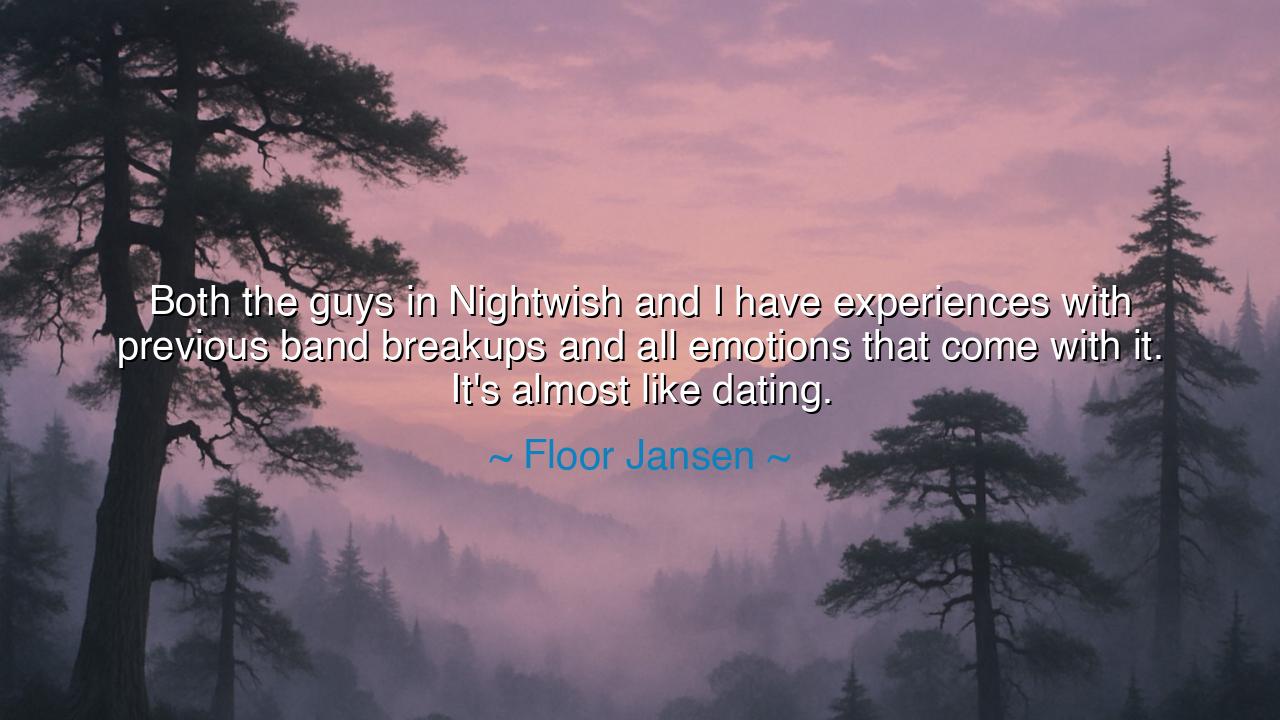
Both the guys in Nightwish and I have experiences with previous
Both the guys in Nightwish and I have experiences with previous band breakups and all emotions that come with it. It's almost like dating.






In the halls where thunder is woven into song, a singer speaks with the steadiness of someone who has crossed storm after storm: “Both the guys in Nightwish and I have experiences with previous band breakups and all emotions that come with it. It’s almost like dating.” So says Floor Jansen, and her words are a lantern for every craft that binds hearts as well as hands. The saying teaches that a band is not only a machine of music; it is a covenant of trust, a braid of chemistry, a promise of commitment—and when such a covenant breaks, it shatters like glass in the same pattern as our romances do.
Hear the meaning under the melody. A band breakup is not merely contracts torn and tours cancelled; it is the aftertaste of betrayal, the ache of grief, the hunger for closure and the fear of starting again. In the beginning there is the bright fever of chemistry—late nights, shared riffs, inside jokes—just as in dating there is the quickening of discovery. Then come the sober tests: can we tune to each other’s tempos; can we forgive missed cues; will we divide the bread of glory and the salt of failure fairly? Music is a mirror: if the relationship is crooked, the sound will list; if the relationship is honest, the stage becomes a temple.
Consider the origin of her insight. Nightwish, like many storied bands, has known changes of voice and vision; members have parted, letters have been written, the public has weighed in from the cheap seats. Floor Jansen herself arrived not as a stranger to loss but as one acquainted with the cliff-edge of endings and the careful climb of beginnings. When she says it is “like dating,” she is not being glib; she is naming that delicate labor of learning each other’s limits, reshaping expectations, and building a fresh house from bricks with old inscriptions on them.
Place beside this a tale from the annals of harmony and heartbreak. In the making of Rumours, Fleetwood Mac staggered through intertwined romances unraveling in real time: lovers parting, partners feuding, lines drawn in dust that microphones could not erase. Yet they transmuted their private emotions into public fire, crafting songs that sounded like blood made into light. The lesson is not that pain is required for art, but that creative partnerships are living things; they demand the same tending as marriages—boundaries, communication, ritual spaces for listening, and the humility to admit when the key must change.
There is an older image, too, for the sages: a quartet tuning before an audience hears a note. Each player turns inward, then outward, inching toward a shared A. This is what dating and bandwork share: the courage to tune, detune, and retune without shame. The worst error is not dissonance; it is pride that refuses to adjust. Thus the road from breakup to rebirth is paved with small obediences—apologies offered without defense, credits shared without envy, silence kept when the song needs space.
What counsel, then, shall we pass down to those who would build art with others? First, choose partners as you would choose a beloved: for character before charisma, for values before virtuosity. Second, write the covenant plainly—how you split the coin, how you make decisions, how you end with dignity if ending must come. Third, practice rehearsals of the heart: after the rehearsal of notes, debrief the emotions; name resentments before they calcify. Fourth, honor seasons—there is a time to tour and a time to heal; a time to push and a time to protect the ember.
And if the breaking comes—as it sometimes must—let it be a clean break and a whole lesson. Grieve without gossip. Bless what was good. Salvage the craft from the wreckage of the quarrel. Then, when the next invitation arrives—be it from a new band or a new love—enter not as a cynic but as a wiser pilgrim: boundaries clearer, listening sharper, gratitude nearer to your tongue. Do this, and the saying will prove true in the best way: the art you make after the storm will carry the calm of one who has learned to keep time with both the drum of the heart and the metronome of the work.
So let it be remembered: band breakups, like dating endings, are not the grave of music but the soil of discernment. From them rise better choruses, kinder green rooms, steadier stages. And when you finally stand in the bright wash of lights beside companions who have likewise been refined, you will feel the rare convergence: trust, chemistry, and commitment humming in tune—proof that the deepest bands, like the deepest loves, are not found whole; they are forged.






AAdministratorAdministrator
Welcome, honored guests. Please leave a comment, we will respond soon